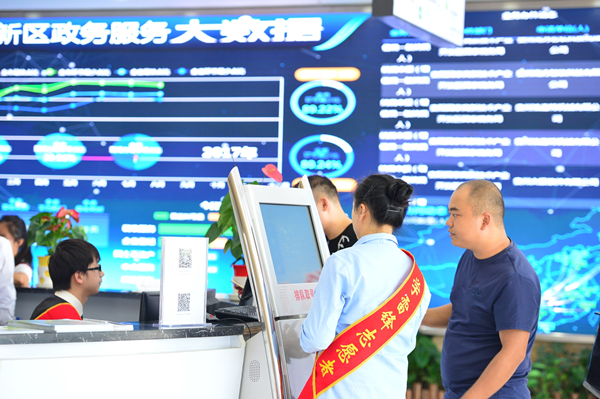Digital economy thrives
Known as China's Data Valley, Guiyang's big data industry kept growing in 2018. The main line of business of the big data enterprises earned 100 billion yuan ($14.56 billion), up 22.4 percent. The bandwidth of provincial network exits reached 9,130 Gbps, and 190,000 kilometers of optical fiber communication cables were in place.
Guiyang was among China's first model cities in terms of 5G technology application, and was selected as an excellent city for the Broadband China project. The number of servers reached 285,000. Ten big data industrial parks were built, 58 well-reputed big data companies came to Guiyang, and there were 51 above-designated-scale big data companies. Manbang Group was named one of Forbes China's 50 Most Innovative Companies. Esgyn Corporation received a silver at the World Internet of Things Exposition. The tradable data capacity of Guiyang's Global Big Data Exchange reached over 150PB.
Big data applications were continuously expanded. Guiyang allowed 100 percent of its administrative data to be shared and exchanged, making it the most open government in terms of data in the nation. The e-government system was fully joined into the Guizhou-Cloud Big Data system, which is an "Internet Plus" government services platform that was hailed in 2018 as one of the top 10 innovative government websites in the nation.
Guiyang launched 100 application scenarios for China's Big Data Valley, fostered 44 typical application and demonstration projects, carried out 36 exemplary projects for big data integration, and undertook 300 demonstration projects for integration.
The building of innovative big data application platforms, such as China's AI Open Innovation Platform, accelerated and the Guiyang Big Data Innovation Industry (Technology) Development Center became a national-level venue for crowd innovation. Continual improvement was made in big data regulations.
Guiyang implemented such laws as the Guiyang Big Data Security Management Regulations, Guiyang Municipal Government Data Resources Management Regulations, Guiyang Municipal Government Regulations on Data Sharing and Openness, and Guiyang Municipal Government Provisional Regulations on Data Sharing and Openness Assessment. Big data standards were continuously reinforced.
In addition, Guiyang participated in developing national standards for transaction data descriptions and data quality evaluation indicators. It implemented local standards for basic demographic and legal entity data, and the National Technical Standard Innovation Center (Guizhou Big Data) was established. Big data security was also enhanced. Guiyang's government cybersecurity index ranked 10th out of China's 36 major cities.

A staff member (L) in the government administrative service hall helps a resident operate a machine. [Photo provided to chinadaily.com.cn]
Presented by China Daily.
黔ICP备05001922号
All Rights Reserved.
Presented by China Daily.
黔ICP备05001922号



